|
|
|
Sort Order |
|
|
|
Items / Page
|
|
|
|
|
|
|
| Srl | Item |
| 1 |
ID:
123617
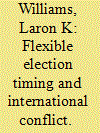

|
|
|
|
|
| Publication |
2013.
|
| Summary/Abstract |
While there are a large number of studies examining the differences in conflict behavior due to varying institutional arrangements, scholars have not effectively addressed the differences in electoral cycles between systems with fixed versus flexible election timing. At the same time that parliamentary regimes give the Prime Minister the power to dissolve parliament, they give the parliament the power to remove the government with a vote of no-confidence. Together, these institutional attributes make the precise timing of the elections-and thus the public's opportunity to hold the government accountable-largely uncertain. I develop a theory that expectations of an upcoming election constrain the foreign policy decision making of executives, and induce pacific behavior. I estimate the probability of an election in a sample of 17 advanced parliamentary democracies from the 1950s to 2001. I find convincing support for my theory, as the probability of hostile dispute initiation is a function of those characteristics that influence the timing of elections, including majority support and the electoral cycle. More specifically, majority and minority governments face varying incentives to initiate disputes because of the different risks of an immediate election.
|
|
|
|
|
|
|
|
|
|
|
|
|
|
|
|
| 2 |
ID:
165884
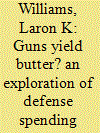

|
|
|
|
|
| Summary/Abstract |
The popular notion of a trade-off between social and defense spending—or guns versus butter—appears often in elite discourse, popular media, and empirical studies of budgetary politics. Yet, there are good reasons to suspect that the public’s preferences for these types of spending do not reflect that trade-off. I develop a theory that whether social and defense spending preferences are competing or complementary depends on if the respondent views the government as an important contributor to job creation. Using data from fifty-nine surveys in twenty-seven countries from 1985 to 2008, I show that favoring government-financed job creation makes a respondent much more likely to view social and defense spending as complementary. Indeed, aside from the anomalous case of the United States, preferences are consistent with guns yield butter instead of guns versus butter. This theory has important implications for the thermostatic model of policy responsiveness and theories of budgetary politics.
|
|
|
|
|
|
|
|
|
|
|
|
|
|
|
|
| 3 |
ID:
128860
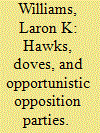

|
|
|
|
|
| Publication |
2014.
|
| Summary/Abstract |
Parliamentary regimes offer the unique opportunity for opposition parties to react to foreign policy by proposing no-confidence motions (NCMs). The threat of an NCM bringing down the government may be enough to induce pacific behavior by the executive. Yet, this simplistic characterization neglects the possible electoral motivations of opportunistic opposition parties. I develop a theory that opposition parties respond to involvement in international conflict by proposing NCMs as a tool to influence voters' opinions with an eye toward the next election. I develop two expectations based on policy disagreement and issue ownership that I use to explain the electorally motivated decision to propose NCMs following conflict. I test these expectations with a dataset of 14 European parliamentary democracies from 1970 to 2001. The empirical evidence suggests that the partisanship of both the government and opposition parties interact to create varying electoral incentives to propose NCMs based on issue ownership. Right-wing opposition parties are more likely to challenge than left-wing parties, and this effect is exacerbated when facing left-wing governments. This study has important implications that underpin a number of theories of the domestic causes of international conflict as well as implications for the study of party strategy.
|
|
|
|
|
|
|
|
|
|
|
|
|
|
|
|
| 4 |
ID:
123142
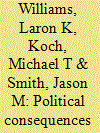

|
|
|
|
|
| Publication |
2013.
|
| Summary/Abstract |
How does transnational terrorism affect the stability of parliamentary governments? Does terrorism cause some governments to fail prematurely and/or does it enhance the probability that some governments will stay in office longer than they otherwise would? Using a duration model on a sample of 18 advanced parliamentary democracies between the late-1960s and 2003, we find that terrorism exacerbates the likelihood of government failure for some governments but not others. Our principal finding is that right-oriented governments are able to keep their hold on power more than left-wing governments when confronted with transnational terrorism.
|
|
|
|
|
|
|
|
|
|
|
|
|
|
|
|
| 5 |
ID:
163289
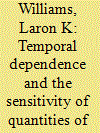

|
|
|
|
|
| Summary/Abstract |
Scholars of international relations increasingly use temporal dependence variables (polynomials or splines) to control for unmodeled duration dependence in nonlinear models (such as logit or probit) of events ranging from interstate conflict and civil war to sanctions imposition and trade agreements. I identify two inferential obstacles that are widespread to nonlinear models, and are exacerbated by the unique features of temporal dependence variables. First, compression causes the quantities of interest to be sensitive to the values in the counterfactual scenario (most notably, time). Second, presenting substantive effects calculated at one simulation scenario (such as an “average” scenario) grossly inflates the representativeness of that scenario and neglects the variability within the sample. The consequences of these problems range in severity from understating the magnitude of the substantive effects to deriving inferences that are wholly unrepresentative of the data. I offer a simple checklist. First, use the values observed in the data to generate in-sample quantities of interest. Second, plot those quantities of interest across the offending variable (for example, time) and interpret the relationship. Finally, provide a sense of the sample's variability in quantities of interest through simple summary statistics (such as mean, standard deviation, and range). These simple fixes provide much-needed transparency and act as a shield against scholars who might otherwise present misleading results.
|
|
|
|
|
|
|
|
|
|
|
|
|
|
|
|
|
|
|
|
|